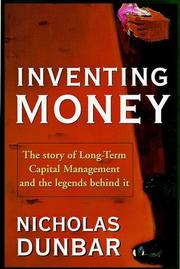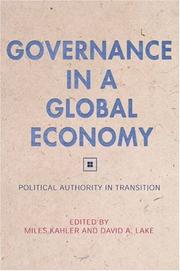| Listing 1 - 7 of 7 |
Sort by
|
Book
Year: 1999 Publisher: [Washington, D.C.] : Dept. of the Treasury,
Abstract | Keywords | Export | Availability | Bookmark
 Loading...
Loading...Choose an application
- Reference Manager
- EndNote
- RefWorks (Direct export to RefWorks)
Book
Year: 1999 Publisher: [Washington, D.C.] : Dept. of the Treasury,
Abstract | Keywords | Export | Availability | Bookmark
 Loading...
Loading...Choose an application
- Reference Manager
- EndNote
- RefWorks (Direct export to RefWorks)

ISBN: 0471899992 Year: 2000 Publisher: Chichester : Wiley & Sons
Abstract | Keywords | Export | Availability | Bookmark
 Loading...
Loading...Choose an application
- Reference Manager
- EndNote
- RefWorks (Direct export to RefWorks)
Finance --- Financial crises --- Long-term Capital Management (Firm)
Dissertation
Abstract | Keywords | Export | Availability | Bookmark
 Loading...
Loading...Choose an application
- Reference Manager
- EndNote
- RefWorks (Direct export to RefWorks)
This master's thesis studies the parallels of the Long-Term Capital Management collapse and the 2008 financial crisis. Even though these crises are very different, several parallels were found, of which only the most important ones are discussed in this paper: systemic risk, leverage, contagion, insufficient models and illiquidity. After reviewing literature, research is conducted with regards to one of the key parallels, namely illiquidity. The Fama and French three-factor model of 1993 is used to study whether a liquidity factor influences expected returns.
Financial crisis. --- Long-Term Capital Management. --- P170-computerwetenschappen. --- P175-informatica. --- S180-economie. --- T120-computertechnologie.
Book
ISBN: 9781118250020 Year: 2012 Publisher: Hoboken Wiley
Abstract | Keywords | Export | Availability | Bookmark
 Loading...
Loading...Choose an application
- Reference Manager
- EndNote
- RefWorks (Direct export to RefWorks)
"A rare analytical look at the financial crisis using simple analysisThe economic crisis that began in 2008 revealed the numerous problems in our financial system, from the way mortgage loans were produced to the way Wall Street banks leveraged themselves. Curiously enough, however, most of the reasons for the banking collapse are very similar to the reasons that Long-Term Capital Management (LTCM), the largest hedge fund to date, collapsed in 1998. The Crisis of Crowding looks at LTCM in greater detail, with new information, for a more accurate perspective, examining how the subsequent hedge funds started by Meriwether and former partners were destroyed again by the lapse of judgement in allowing Lehman Brothers to fail. Covering the lessons that were ignored during LTCM's collapse but eventually connected to the financial crisis of 2008, the book presents a series of lessons for hedge funds and financial markets, including touching upon the circle of greed from homeowners to real estate agents to politicians to Wall Street. Guides the reader through the real story of Long-Term Capital Management with accurate descriptions, previously unpublished data, and interviews Describes the lessons that hedge funds, as well as the market, should have learned from LTCM's collapse Explores how the financial crisis and LTCM are a global phenomena rooted in failures to account for risk in crowded spaces with leverage Explains why quantitative finance is essential for every financial institution from risk management to valuation modeling to algorithmic trading Is filled with simple quantitative analysis about the financial crisis, from the Quant Crisis of 2007 to the failure of Lehman Brothers to the Flash Crash of 2010 A unique blend of storytelling and sound quantitative analysis, The Crisis of Crowding is one of the first books to offer an analytical look at the financial crisis rather than just an account of what happened. Also included are a layman's guide to the Dodd-Frank rules and what it means for the future, as well as an evaluation of the Fed's reaction to the crisis, QE1, QE2, and QE3"--
Financial crises --- Global Financial Crisis, 2008-2009 --- History --- Long-term Capital Management (Firm)
Book
ISBN: 1119203414 1283604205 9786613916655 1118284801 Year: 2012 Publisher: Hoboken, NJ : Bloomberg Press/Wiley,
Abstract | Keywords | Export | Availability | Bookmark
 Loading...
Loading...Choose an application
- Reference Manager
- EndNote
- RefWorks (Direct export to RefWorks)
"A rare analytical look at the financial crisis using simple analysisThe economic crisis that began in 2008 revealed the numerous problems in our financial system, from the way mortgage loans were produced to the way Wall Street banks leveraged themselves. Curiously enough, however, most of the reasons for the banking collapse are very similar to the reasons that Long-Term Capital Management (LTCM), the largest hedge fund to date, collapsed in 1998. The Crisis of Crowding looks at LTCM in greater detail, with new information, for a more accurate perspective, examining how the subsequent hedge funds started by Meriwether and former partners were destroyed again by the lapse of judgement in allowing Lehman Brothers to fail. Covering the lessons that were ignored during LTCM's collapse but eventually connected to the financial crisis of 2008, the book presents a series of lessons for hedge funds and financial markets, including touching upon the circle of greed from homeowners to real estate agents to politicians to Wall Street. Guides the reader through the real story of Long-Term Capital Management with accurate descriptions, previously unpublished data, and interviews Describes the lessons that hedge funds, as well as the market, should have learned from LTCM's collapse Explores how the financial crisis and LTCM are a global phenomena rooted in failures to account for risk in crowded spaces with leverage Explains why quantitative finance is essential for every financial institution from risk management to valuation modeling to algorithmic trading Is filled with simple quantitative analysis about the financial crisis, from the Quant Crisis of 2007 to the failure of Lehman Brothers to the Flash Crash of 2010 A unique blend of storytelling and sound quantitative analysis, The Crisis of Crowding is one of the first books to offer an analytical look at the financial crisis rather than just an account of what happened. Also included are a layman's guide to the Dodd-Frank rules and what it means for the future, as well as an evaluation of the Fed's reaction to the crisis, QE1, QE2, and QE3"--
Financial crises --- Global Financial Crisis, 2008-2009. --- History --- Long-term Capital Management (Firm)

ISBN: 0691114013 0691114021 069123468X Year: 2003 Publisher: Princeton (N.J.) Princeton university press
Abstract | Keywords | Export | Availability | Bookmark
 Loading...
Loading...Choose an application
- Reference Manager
- EndNote
- RefWorks (Direct export to RefWorks)
Critics of globalization claim that economic integration drains political authority from states: devolving authority to newly empowered regions, delegating it to supranational organizations, and transferring it to multinational firms and nongovernmental organizations. Globalization is also attacked for forcing convergence of state institutions and policies and threatening the ability of societies to chart their own democratically determined courses. In Governance in a Global Economy, Miles Kahler and David Lake assemble the contributions of seventeen leading scholars who have systematically investigated how global economic integration produces changes of governance. These authors conclude that globalization has created a new and intricate fabric of governance, but one that fails to match the stark portrait of beleaguered states. Exploring changes in governance across several policy areas (such as tourism, trade, finance, and fiscal and monetary policy), the authors demonstrate that globalization changes the policy preferences of some actors, increases the bargaining power of others, and opens new institutional options for yet others. By reintroducing agency and choice into our understanding of globalization, this book provides important new insights into the complex and contingent effects of globalization on political authority and governance. The introduction and the conclusion are by the editors the contributors are James A. Caporaso, Benjamin J. Cohen, Barry Eichengreen, Zachary Elkins, Geoffrey Garrett, Peter Gourevitch, Virginia Haufler, Michael J. Hiscox, Robert O. Keohane, Lisa L. Martin, Walter Mattli, Kathleen R. McNamara, Joseph S. Nye, Jr., Jonathan Rodden, Ronald Rogowski, Beth A. Simmons, and Peter Van Houten.
International economic relations --- Economic policy and planning (general) --- Corporate governance --- International business enterprises --- -International business enterprises --- -Globalization --- -Business enterprises, International --- Corporations, International --- Global corporations --- International corporations --- MNEs (International business enterprises) --- Multinational corporations --- Multinational enterprises --- Transnational corporations --- Business enterprises --- Corporations --- Joint ventures --- Governance, Corporate --- Industrial management --- Directors of corporations --- Global cities --- Globalisation --- Internationalization --- International relations --- Anti-globalization movement --- Management --- Government policy --- Political aspects --- #A0402PSA --- -Management --- -Governance, Corporate --- Business enterprises, International --- POLITICAL SCIENCE / International Relations / General --- Globalization --- Corporate governance. --- Internationale ondernemingen. --- Politieke aspecten. --- Internationalisatie. --- Weltwirtschaft --- Governance --- Politik --- Globalisierung --- Global Governance --- 83.83 large-scale enterprise. --- Mondialisation --- Entreprises multinationales --- Gouvernement d'entreprise. --- Political aspects. --- Government policy. --- Management. --- Aspect politique. --- Politique gouvernementale. --- Gestion. --- -Global cities --- Internationale Politik --- Weltgesellschaft --- Internationalisierung --- Staatspolitik --- Politische Lage --- Politische Entwicklung --- Politische Situation --- Politische Steuerung --- Internationale Wirtschaft --- Internationale Wirtschaftsbeziehungen --- Internationale Wirtschaftspolitik --- Accountability. --- Bank for International Settlements. --- Business economics. --- Capital control. --- Capital cost. --- Capital gain. --- Capital market. --- Capitalism. --- Central bank. --- Competition (economics). --- Consumer organization. --- Consumption (economics). --- Corporate capitalism. --- Corporate social responsibility. --- Currency. --- Decentralization. --- Developed country. --- Economic Life. --- Economic cost. --- Economic development. --- Economic geography. --- Economic globalization. --- Economic history. --- Economic integration. --- Economic interventionism. --- Economic liberalization. --- Economic model. --- Economic planning. --- Economic policy. --- Economic problem. --- Economics. --- Economy and Society. --- Economy. --- Environmental economics. --- Euromarket. --- Externality. --- Financial World. --- Financial capital. --- Financial market participants. --- Fiscal policy. --- Foreign direct investment. --- Free trade debate. --- Global Exchange. --- Global Finance (magazine). --- Global Policy. --- Global financial system. --- Global governance. --- Global production network. --- Global warming. --- Globalism. --- Globalization. --- Governance. --- Hedge fund. --- Index Of Economic Freedom. --- Industrialisation. --- Industry self-regulation. --- Institute of International Finance. --- Institution. --- Institutional economics. --- International Financial Reporting Standards. --- International Monetary Fund. --- International financial institutions. --- International monetary systems. --- International organization. --- International political economy. --- International relations. --- International trade. --- Internationalism (politics). --- Journal of Economic Perspectives. --- Liberalization. --- Long-Term Capital Management. --- Macroeconomics. --- Market economy. --- Market integration. --- Market portfolio. --- Monetary policy. --- Money market. --- Neoclassical Growth Theory. --- New International Economic Order. --- OECD Development Centre. --- Political economy. --- Political entrepreneur. --- Prospectus (finance). --- Public finance. --- Regulatory competition. --- Shareholder. --- Tourism. --- Trade and development. --- Transition economy. --- Transnational governance. --- United Nations Environment Programme. --- Working Group on Financial Markets. --- World Bank. --- World Business Council for Sustainable Development. --- World Development Indicators. --- World Politics. --- World Trade Organization. --- World Wide Web Consortium. --- World economy.
| Listing 1 - 7 of 7 |
Sort by
|

 Search
Search Feedback
Feedback About UniCat
About UniCat  Help
Help News
News